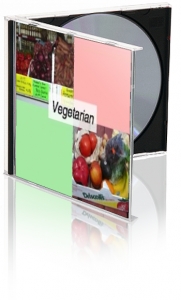It's Vegetarian Awareness Month and we're celebrating by cracking the vault and giving you a sneak peek at our members-only exclusive content. If you'd like to receive this content all the time -- and not just when we choose to give you a little glimpse -- you can sign up to be a Communicating Food for Health member today!According to a poll done by the National Restaurant Association, vegetarian cuisine is one of the fastest growing cuisines in the United States and Canada. Vegetarian food’s popularity has been attributed to Baby Boomers’ quest for something new and healthful, as well as to Generation X’s and Y’s concern about the environment, along with the incorporation of ethnic cuisines, such as Indian and Thai, that feature many vegetarian dishes.There are lots of other possible reasons to consider, but the bottom line is the vegetarian meals are on the rise. So let's take a minute to learn a bit more about approaches to vegetarianism and some staple vegetarian meals...Common Vegetarian Styles:
Semi-Vegetarians eat poultry, eggs, fish, and dairy products, but avoid red meat. This is perhaps the most mainstream of vegetarian styles as many health-conscious individuals lean toward a plant-based diet.
Pesco-Vegetarians, a.k.a. pescetarians, eat fish, eggs, and dairy, but avoid poultry and red meat.
Lacto-Ovo-Vegetarians, often simply called vegetarians, eat dairy products and eggs, but no actual meats from animals.
Vegans, on the other hand, avoid all foods of animal origin, including dairy products, eggs, and even honey.
Keep It Healthful:All individuals, including vegetarians, should be concerned with saturated fat and sodium intake. Did you know that many vegetarian foods can still be high in saturated fat and sodium? It's true! So, if you're using eggs, use only the whites. If you eat poultry, use only the white meat without the skin, and if you're consuming dairy, choose only skim. This will help you reduce your saturated fat consumption.Iron and calcium may be a concern for some vegetarians. Beans, nuts and seeds are good sources, as are fortified products such as cereals and soymilk. Dark green vegetables should be included daily on the menu. A vegan diet must be supplemented with vitamin B12.Being vegetarian doesn't automatically meant that you're eating healthfully. Besides eliminating meat from your diet, you need to consume plenty of vegetables, legumes, whole grains, and fruits in order to have a healthful, balanced diet.Quick Recipe: Vegetable BrothUse this savory stock instead of chicken or meat broth. It's easy to make a batch and freeze it in individual servings to use as needed (we recommend freezing it in ice cube trays or 1 cup portions. This recipe makes about 1 quartIngredients
1 teaspoon oil
½ cup chopped onions
¼ cup chopped celery
¼ cup chopped carrots
½ cup peeled, diced sweet potatoes
½ cup peeled, diced turnips or parsnips
2 cloves minced garlic
1 teaspoon dried thyme
1 bay leaf
1 quart water
½ teaspoon black pepper
¼ cup minced fresh dill
Directions:
Heat a large pot or Dutch oven over medium-high heat. Add the oil and sauté the onions, celery, and carrots until golden, about 5 minutes.
Add the rest of the ingredients and bring to a boil. Lower heat to simmer and simmer on low for about 45 minutes.
Pour broth through a fine mesh strainer and reserve the liquid to use as needed.
Broth keeps in the fridge for up to one week or in the freezer for up to 6 months. Try using this as a base for soups and stews, or even with stir fries or pasta dishes.
Stephanie Ronco has been editing for Food and Health Communications since 2011. She graduated from Colorado College magna cum laude with distinction in Comparative Literature. She was elected a member of Phi Beta Kappa in 2008.
Cracking the Vault for Vegetarian Awareness Month
Keep It Healthful:All individuals, including vegetarians, should be concerned with saturated fat and sodium intake. Did you know that many vegetarian foods can still be high in saturated fat and sodium? It's true! So, if you're using eggs, use only the whites. If you eat poultry, use only the white meat without the skin, and if you're consuming dairy, choose only skim. This will help you reduce your saturated fat consumption.Iron and calcium may be a concern for some vegetarians. Beans, nuts and seeds are good sources, as are fortified products such as cereals and soymilk. Dark green vegetables should be included daily on the menu. A vegan diet must be supplemented with vitamin B12.Being vegetarian doesn't automatically meant that you're eating healthfully. Besides eliminating meat from your diet, you need to consume plenty of vegetables, legumes, whole grains, and fruits in order to have a healthful, balanced diet.Quick Recipe: Vegetable BrothUse this savory stock instead of chicken or meat broth. It's easy to make a batch and freeze it in individual servings to use as needed (we recommend freezing it in ice cube trays or 1 cup portions. This recipe makes about 1 quartIngredients
Directions:
Veggie Web Sources
By Nancy Berkoff, RD, EdD, CCEFor more about vegetarianism and eating a plant-based diet, check out the Nutrition Education Store!


Stephanie Ronco has been editing for Food and Health Communications since 2011. She graduated from Colorado College magna cum laude with distinction in Comparative Literature. She was elected a member of Phi Beta Kappa in 2008.
"Natural" as a Food Label: What Does It Mean?
November 2013